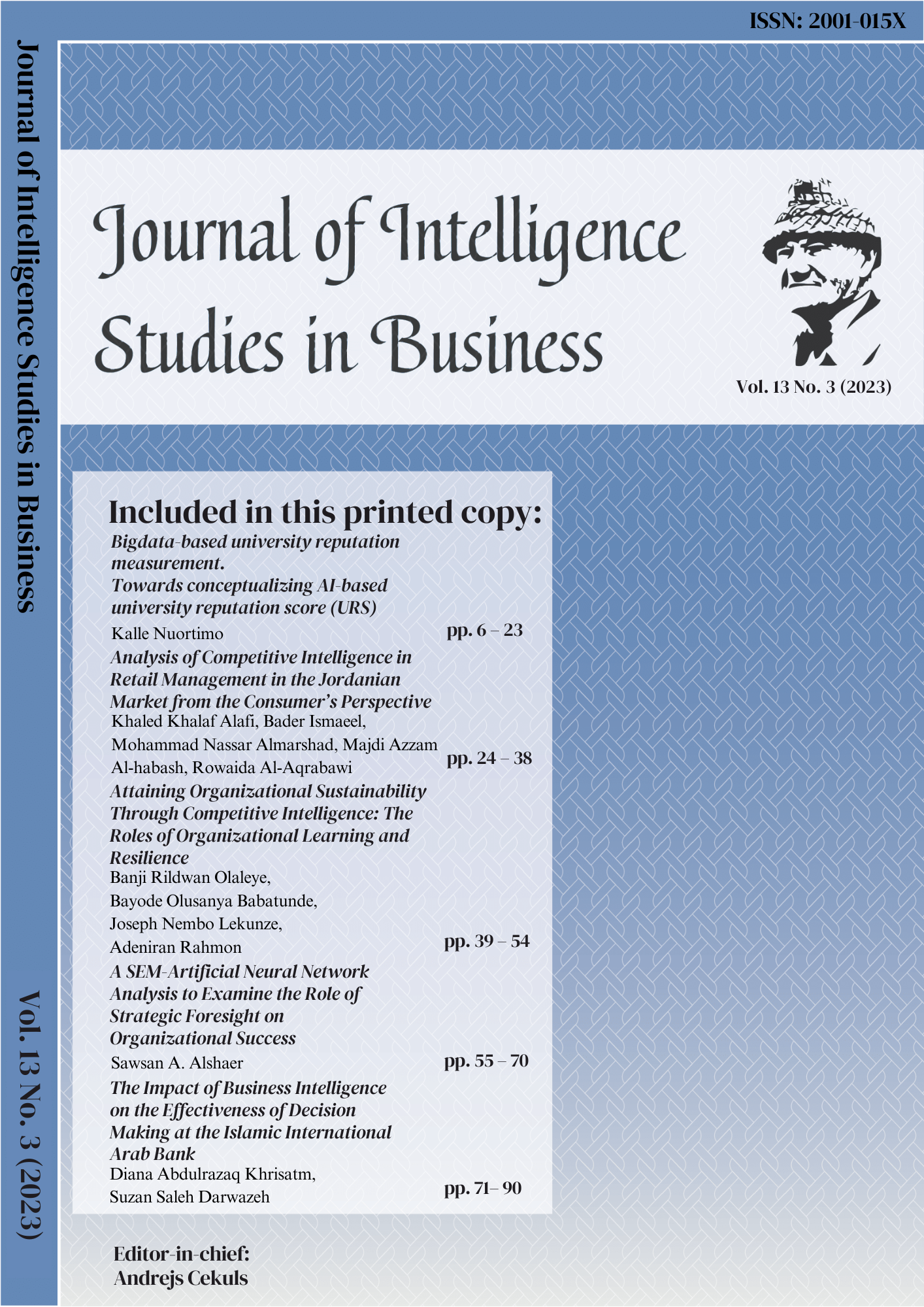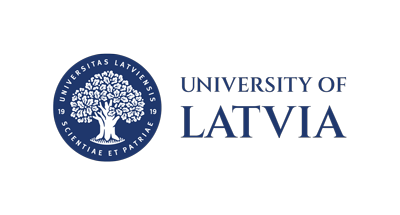Attaining Organizational Sustainability Through Competitive Intelligence: The Roles of Organizational Learning and Resilience
DOI:
https://doi.org/10.37380/jisib.v13i3.1143Keywords:
Competitive Intelligence, FMCG companies, Organizational learning, Organizational resilience, PLS-SEM, SustainabilityAbstract
Following the resource-based view (RBV) theory, the Food-Moving Consumer Goods (FMCG) industry also pitches in to help the economy grow. This study is intended to investigate competitiveness and organizational learning against the sustainability of FMCG in Nigeria. However, the interlink between competitive intelligence and organizational sustainability was investigated, with organizational resilience performing a mediating function. 517 employees from FMCG companies in Nigeria were examined using quantitative and cross-sectional research methods, whereby the data obtained was analyzed using partial least squares structural equation modelling (PLS-SEM) to establish proposed association. The results confirmed the expected connections, showing that competitive intelligence (CI) was directly and positively linked to organizational sustainability (OS). They also showed that organizational learning was significantly and positively linked to both competitive intelligence and organizational sustainability. Similarly, the findings revealed that organizational resilience partially mediated the association between CI and OS. Gaining an advantage over rivals and successfully achieving sustainable performance are two areas where this research can help company management. Additionally, FMCG companies should integrate organizational learning and resilience approaches into their sustainability efforts.
References
Alcover, C. M., Rico, R., Turnley, W. H., & Bolino, M. C. (2017). Understanding the changing nature of psychological contracts in 21st century organizations: A multiple-foci exchange relationships approach and proposed framework. Organizational Psychology Review, 7(1), 4-35.
Allen, N.J. and Meyer, J. P. (1990). The measurement and antecedents of affective, continuance and normative commitment to the organization. Journal of Occupational Psychology, 63(1), 1-18.
Al-Omoush, K., Ribeiro-Navarrete, B. and McDowell, W.C. (2023), "The impact of digital corporate social responsibility on social entrepreneurship and organizational resilience", Management Decision, Vol. ahead-of-print No. ahead-of-print. https://doi.org/10.1108/MD-11-2022-1613
Anderson, J. C. & Gerbing, D. W. (1988). Structural equation modeling in practice: A review and recommended two-step approach. Psychological Bulletin, 103(3), 411.
Anifowose, O. N., M. Ghasemi & Olaleye B. R. (2022). Total quality management and SMEs performance: Mediating role of innovation speed. Sustainability, 14(14), 8719.
Balasubramanian, N., & Balaji, M. (2022). Organisational sustainability scale-measuring employees’ perception on sustainability of organization. Measuring Business Excellence, 26(3), 245-262.
Barasa, E., Mbau, R., & Gilson, L. (2018). What is resilience and how can it be nurtured? A systematic review of empirical literature on organizational resilience. International journal of health policy and management, 7(6), 491.
Barney, J. B. (1991). Firm Resources and Sustained Competitive Advantage. Journal of Management, 17(1), 99-120.
Baron, R. M., & Kenny, D. A. (1986). The moderator–mediator variable distinction in social psychological research: Conceptual, strategic, and statistical considerations. Journal of personality and social psychology, 51(6), 1173.
Barson, D. C. (2002). Competing intelligently. GCI, June, 26-28.
Bojuwon, M., Olaleye, B. R. & Ojebode, A. A. (2023). Financial Inclusion and Financial Condition: The Mediating Effect of Financial Self Efficacy and Financial Literacy. Vision: The Journal of Business Perspective (VIS), pp 1-12. https://doi.org/10.1177/09722629231166200
Brundtland, G. H. (1987). Report of the World Commission on environment and development: our common future. UN.
Calof, J. L., & Wright, S. (2008). Competitive intelligence: A practitioner, academic, and inter-disciplinary perspective. European Journal of Marketing, 42(7/8), 717-730.
Carayannis, E.G., Sindakis, S. & Walter, C. (2015). Business model innovation as lever of organizational sustainability. The Journal of Technology Transfer, 40(1), 85-104.
Cavallo, A., Sanasi, S., Ghezzi, A., & Rangone, A. (2021). Competitive intelligence and strategy formulation: connecting the dots. Competitiveness Review: An International Business Journal, 31(2), 250-275.
Cekuls, A. (2023). The Evolution of Competitive Intelligence: A Systemic Approach to Organizational Management. Journal of Intelligence Studies in Business, 13(2), 4-5.
Dabos, G. E., & Rousseau, D. M. (2004). Mutuality and reciprocity in the psychological contracts of employees and employers. Journal of Applied Psychology, 89(1), 52–72.
Dess, G.G., Ireland, R.D., Zahra, S.A., Floyd, S.W., Janney, J. J. & Lane, P. J. (2003). Emerging issues in corporate entrepreneurship. Journal of Management, 29(3), 351-378.
Dijkstra, T. K. & J. Henseler (2015). Consistent Partial Least Squares Path Modeling. MIS Quarterly, 39(2), 297-316.
Dishman, P. L., and Calof, J. L. (2008). Competitive intelligence: a multiphasic precedent to marketing strategy. European Journal of Marketing, 42(7/8), 766-785.
Elkington, J. (1997). The triple bottom line. Environmental management: Readings and cases, 2, 49-66.
Emmons, C. B. (2013). Improving organizational performance: Building organizational resilience and sustainability through knowledge-sharing relationships (Doctoral dissertation, Walden University).
Engström, A. & Käkelä, N. (2019). Early Steps in Learning about Organizational Learning in Customization Settings: A Communication Perspective. Learn. Organ. 26, 27–43.
Fitzpatrick, W.M. (2003). Uncovering trade secrets: the legal and ethical conundrum of creative competitive intelligence. SAM Advanced Management Journal, 68(13), 4.
Fornell, C. & Larcker, D. F. (1981). Structural equation models with unobservable variables and measurement error: Algebra and statistics. Journal of Marketing Research, 18, 382-388
Fuld, L. (1995), Competitor Intelligence, Wiley, New York, NY.
Ghasemzadeh, P., Nazari, J. A., Farzaneh, M. & Mehralian, G. (2019). Moderating role of innovation culture in the relationship between organizational learning and innovation performance. Learn. Organ., 26, 289–303.
Giesenbauer, B., & Müller-Christ, G. (2020). University 4.0: Promoting the transformation of higher education institutions toward sustainable development. Sustainability, 12(8), 3371.
Gilad, B. (1989). The role of organized competitive intelligence in corporate strategy. Columbia Journal of World Business, 24(4), 29-36.
Henseler, J., Ringle, C. M., and Sarstedt, M. (2015). A new criterion for assessing discriminant validity in variance-based structural equation modeling. Journal of the Academy of Marketing Science, 43(1), 115-135
Huang, W., Chen, S., & Nguyen, L. T. (2020). Corporate social responsibility and organizational resilience to COVID-19 crisis: An empirical study of Chinese firms. Sustainability, 12(21), 8970.
Issau, K., Gnankob, R. I., Ansong, A., Acquah, I. S. K., & Erskine-Sackey, N. M. (2023). Organisational learning and customer focus: implications on firm performance in the hotel industry. International Journal of Work Innovation, 4(2), 116-132.
Johnson, J. O. S. (2023). Unveiling organizational resilience: Evaluating Yara’s management process in response to the Covid-19 pandemic (Bachelor's thesis, uis)
Kale, P., Singh, J., & Perlmutter, H. (2000). Learning and protection of assets in strategic alliance: Building Relationship Capital. Strategic Management Journal, 21(3), 217–237.
Kantur, D. ve İşeri-Say, A. (2015). Measuring organizational resilience: A scale development. Journal of Business Economics and Finance, 4(3), 456-472.
Khan, N. A., & Khan, A. N. (2019). What followers are saying about transformational leaders fostering employee innovation via organisational learning, knowledge sharing and social media use in public organisations?. Government Information Quarterly, 36(4), 101391.
Kline, R. B. (2005). Principles and practice of structural equation modeling. (2nd ed.). New York: Guilford Press.
Kordab, M., Raudeliūnienė, J., & Meidutė-Kavaliauskienė, I. (2020). Mediating role of knowledge management in the relationship between organizational learning and sustainable organizational performance. Sustainability, 12(23), 10061.
Lau, K. W., Lee, P. Y., & Chung, Y. Y. (2018). A collective organizational learning model for organizational development. Leadership & Organization Development Journal, 40(1), 107-123.
Mokhtar, A. R., Anindita, M., & Suhaimi, Z. S. (2023). Leveraging Supply Chain Leadership for Dynamic Capabilities and Organisational Resilience. Advances in Social Sciences Research Journal, 10(6.2), 54-66.
Musarapasi, S., & Garanti, Z. (2020). Effects of authoritarian and ethical leadership on employee performance: mediating role of employee competencies and performance management practices in Zimbabwean banks. Journal of Regional Economic and Social Development, 12, 143-163.
Nasri, W., & Zarai, M. (2013). Key success factors for developing competitive intelligence in organisation. American Journal of Business and Management, 2(3), 239-244.
Ngboawaji D.N & Nduka K.O. (2021). Competitive intelligence and resilience of Small and medium scale enterprises in developing economies. The case Benin city, Nigeria. Journal Ekonomi Akantansi and Management. 20 (2). 112-133.
Olaleye, B. R., Abdurrashid, I., & Mustapha, B. (2023). Organizational sustainability and TQM practices in hospitality industry: employee-employer perception. The TQM Journal, Vol. ahead-of-print No. ahead-of-print. https://doi.org/10.1108/TQM-10-2022-0306
Olaleye, B. R., Bojuwon, M., Ibrahim, R. I. M., & Ali-Momoh, B. O. (2021). Nexus between strategic thinking, competitive intelligence and innovation capability: Managerial support as a moderator. Journal of Intelligence Studies in Business, 11(3).
Olaleye R., B., Emeagwali L., O., Olasehinde A., S., Oladele O., T., Adelakun G., C., Ebhoaye O., S., & Solanke T., F. (2021). Protocol for a Scoping Review on the Conceptualization of Competitive Intelligence in Entrepreneurship Literature. Annals of Spiru Haret University. Economic Series, 20(3), 209-223.
Pole, J. G., Madsen, E., & Dishman, P. (2000). Competitive intelligence as a construct for organizational change. Competitive Intelligence Review: Published in Cooperation with the Society of Competitive Intelligence Professionals, 11(4), 25-31.
Rahma, Z., & Mekimah, S. (2023). The Role of Competitive Intelligence in Improving Performance through Organizational Learning, A case study Start-ups in Algeria. Journal of Intelligence Studies in Business, 13(1), 53-64.
Sahin, M., & Bisson, C. (2021). A competitive intelligence practices typology in an airline company in Turkey. Journal of the Knowledge Economy, 12, 899-922.
Santos-Vijande, M.L., Lo´pez-Sa´nchez, J. A. & Trespalacios, J. A. (2012). How organizational learning affects a firm’s flexibility, competitive strategy, and performance. Journal of Business Research, 65(8), 1079-1089.
Senge, P. M. (1990). The Fifth Discipline: The Art and Practice of the Learning Organization. Doubleday
Sezen-Gültekin, G., & Argon, T. (2020). Examination of the Relationship between Organizational Resilience and Organizational Sustainability at Higher Education Institution. International Journal of Curriculum and Instruction, 12, 329-343.
Stefanikova, Ľ., Rypakova, M., & Moravcikova, K. (2015). The impact of competitive intelligence on sustainable growth of the enterprises. Procedia Economics and Finance, 26, 209-214.
Sullivan, G. M. & Feinn, R. (2012). Using Effect Size-or Why the P-Value Is Not Enough. Journal of graduate medical education, 4(3), 279–282.
Tran, H.Q. & Pham, N.T.B. (2019). Organizational Learning as a Moderator of the Effect of Employee Participation on Academic Results: An Empirical Study in Vietnam. Learn. Organ., 26, 146–159.
Vedder, R.G. & Guynes, C.S. (2002). Guynes CIOS’ perspectives on competitive intelligence. Information Systems Management, Fall, pp. 49-55.
Vetbuje, B. G. & B. R. Olaleye (2022). Relationship between Emotional Intelligence, Emotional Labour, Job Stress and Burnout: Does coping strategy work? Journal of Intelligence Studies in Business, 12(1) 6-19.
Visser, W. (2017). Our common future (‘The brundtland report’) world commission on environment and development (1987). In The Top 50 Sustainability Books (pp. 52-55). Routledge.
Downloads
Published
Issue
Section
License
Copyright (c) 2024 Journal of Intelligence Studies in Business

This work is licensed under a Creative Commons Attribution-NonCommercial-NoDerivatives 4.0 International License.
Authors who publish with this journal agree to the following terms:
- Authors retain copyright and grant the journal right of first publication with the work simultaneously licensed under a Creative Commons Attribution License that allows others to share the work with an acknowledgement of the work's authorship and initial publication in this journal.
- Authors are able to enter into separate, additional contractual arrangements for the non-exclusive distribution of the journal's published version of the work (e.g., post it to an institutional repository or publish it in a book), with an acknowledgement of its initial publication in this journal.
- Authors are permitted and encouraged to post their work online (e.g., in institutional repositories or on their website) prior to and during the submission process, as it can lead to productive exchanges, as well as earlier and greater citation of published work (See The Effect of Open Access).








